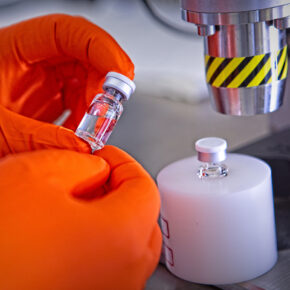
Symbiosis supports the GMP aseptic manufacture of a wide range of vaccine projects, including viral vectors. Accelerate your vaccine to clinical trials with Symbiosis as your trusted partner.

As viral vectors and nucleic acid-based vaccines increasingly gain regulatory acceptance, traditional manufacturing models must evolve to keep up. Agile biotechnology companies and research institutions need to find experienced and scalable partners to bring their vaccines to the clinic.

From traditional attenuated and inactivated vaccines to recombinant, viral vector and nucleic acid-based vaccine technologies; Symbiosis works with you to deliver clinical and small-scale commercial vaccine manufacturing.
From our BSL-1 and BSL-2 GMP aseptic fill-finish facilities, we have successfully delivered many vaccine filling projects, including the Oxford-AstraZeneca SARS-CoV-2 vaccine based on a chimp adenovirus viral vector platform.
Among the first biologic therapies since the 19th century, vaccines have provided protection against many serious global diseases caused by viruses.
Vaccines offer significant protection for both large and small patient populations, as evidenced by the development of the globally-distributed SARS-CoV-2 (COVID-19) vaccine and for niche populations such as neurodegenerative and cancer vaccines.
Broadly, vaccines fall into five categories:
Live-attenuated vaccines are weakened or parallel strains of live viruses or microbes which cause a minor infection within the individual to provoke an intended immune response.
Inactivated vaccines are vaccines where a specific infectious agent has been rendered non-infectious, e.g. by chemical treatment. However, antigenic elements remain sufficiently intact to provide the appropriate immune response within the patient.
Recombinant vaccines are preparations of specific viral or microbial proteins which aim to build an immune response. These are manufactured in much the same way as other recombinant biologics, with the addition of adjuvants and other excipients to elicit a stronger immune response.
Viral vectors are a relatively new class of vaccines where a replication-incompetent virus, such as an adenovirus, is engineered to present the appropriate antigens of the target agent to the immune system. An example of this is the Oxford-AstraZeneca SARS-CoV-2 (COVID-19) vaccine, which is based on an engineered chimp adenovirus vector platform.
DNA or RNA (Nucleotide) vaccines are a relatively new class of vaccines, where the genetic material encoding the appropriate antigen is administered. Here, the nucleotide enters the cells of the subject, and the antigenic protein is produced to generate an immune response. Most notable examples of this vaccine are the mRNA vaccines from Pfizer-BioNTech and Moderna against SARS-CoV-2 (COVID-19).